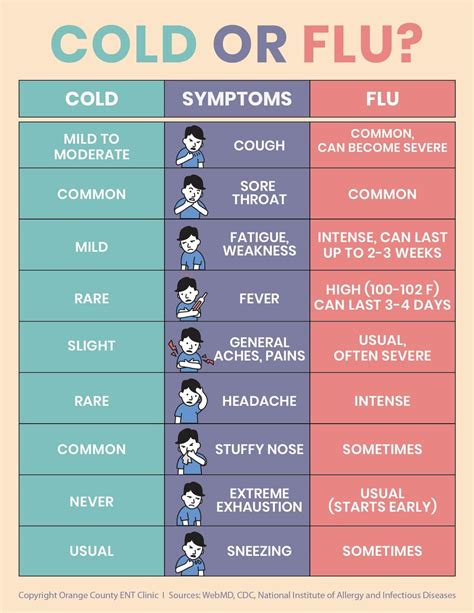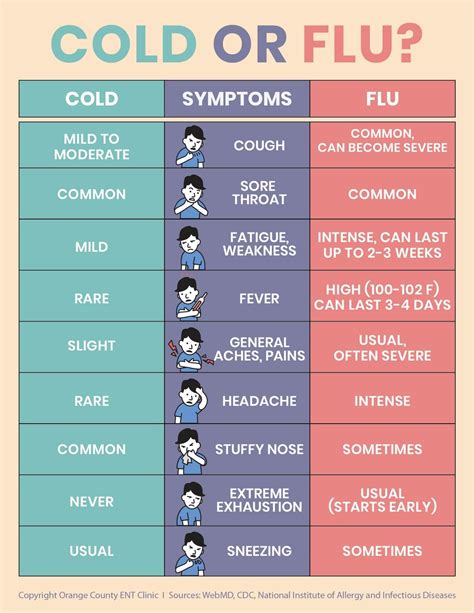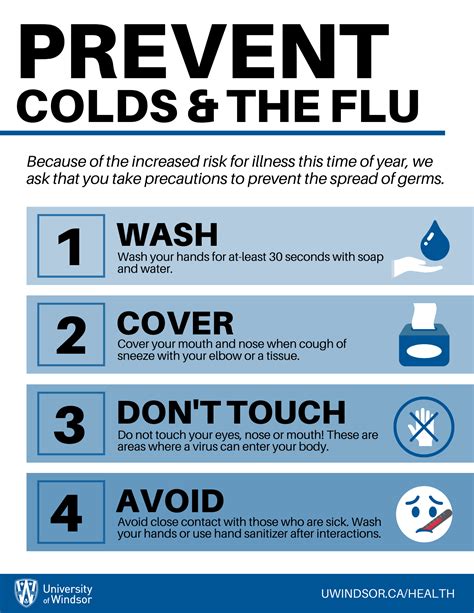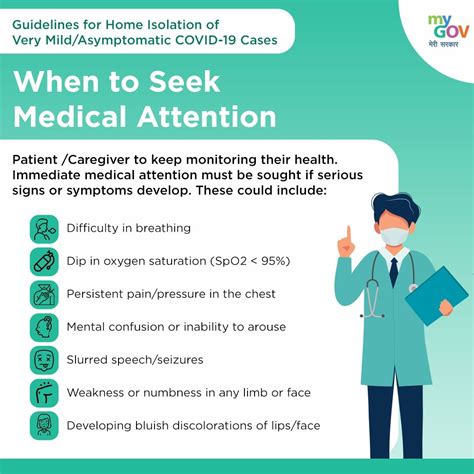Intro
As the seasons change, many of us are familiar with the unwelcome arrival of a cold. The common cold is a viral infection that affects the upper respiratory system, causing a range of uncomfortable symptoms. From a runny nose to a sore throat, the signs of a cold can be debilitating and disrupt our daily lives. Understanding the signs of a cold is crucial in seeking timely medical attention and taking steps to manage the symptoms. In this article, we will delve into the world of colds, exploring the common signs, symptoms, and ways to combat this pesky illness.
The common cold is a highly contagious infection that can be caused by over 200 different viruses. The most common culprits are rhinoviruses, coronaviruses, and adenoviruses. When an infected person talks, coughs, or sneezes, they release tiny droplets into the air, which can be inhaled by others, spreading the infection. The cold virus can also survive on surfaces, making it easy to pick up the infection by touching contaminated objects and then touching our faces. With so many ways to catch a cold, it's no wonder that the average adult experiences two to three colds per year.
The onset of a cold can be sudden, with symptoms appearing within 1-3 days of exposure to the virus. The signs of a cold can vary from person to person, but common symptoms include a runny or stuffy nose, sneezing, coughing, sore throat, and fatigue. As the cold progresses, some people may experience a headache, muscle aches, and a loss of appetite. In severe cases, a cold can lead to complications such as sinus infections, bronchitis, or pneumonia, especially in vulnerable populations like the elderly, young children, and those with weakened immune systems.
Common Signs Of A Cold

The common signs of a cold can be divided into two categories: early and late symptoms. Early symptoms, which appear within the first 24-48 hours of infection, include a scratchy or sore throat, a runny nose, and sneezing. As the cold progresses, late symptoms like coughing, fatigue, and body aches become more pronounced. In some cases, people may experience a low-grade fever, usually below 102°F (39°C). It's essential to recognize these signs and seek medical attention if symptoms worsen or last longer than expected.
Early Signs Of A Cold
The early signs of a cold can be mild and may resemble other conditions, making it challenging to diagnose. However, paying attention to these initial symptoms can help you take proactive steps to manage the illness. Some common early signs of a cold include: * A tickly or scratchy sensation in the throat * A runny or stuffy nose * Sneezing or congestion * Mild fatigue or lethargy * A slight headache or facial pressureSymptoms Of A Cold

As the cold progresses, symptoms can become more severe and debilitating. Some common symptoms of a cold include:
- Coughing, which can be dry or productive
- Sore throat or tonsils
- Fatigue or exhaustion
- Body aches or muscle pains
- Loss of appetite or taste
- Headache or facial pressure
- Sneezing or congestion
- Runny or stuffy nose
Late Signs Of A Cold
The late signs of a cold can be more severe and may indicate the presence of complications. If you experience any of the following symptoms, seek medical attention: * High fever (above 102°F or 39°C) * Severe headache or facial pain * Difficulty breathing or shortness of breath * Chest pain or tightness * Severe fatigue or exhaustion * Worsening cough or coughing up yellow or green mucusManaging Cold Symptoms

While there is no cure for the common cold, there are several ways to manage symptoms and reduce the risk of complications. Some effective ways to manage cold symptoms include:
- Staying hydrated by drinking plenty of fluids, such as water, tea, or soup
- Resting and avoiding strenuous activities
- Using over-the-counter medications, such as pain relievers or decongestants
- Practicing good hygiene, such as washing your hands frequently and avoiding close contact with others
- Using a humidifier to add moisture to the air and relieve congestion
- Trying steam inhalation or a warm compress to ease sinus pressure
Home Remedies For A Cold
In addition to medical treatments, there are several home remedies that can help alleviate cold symptoms. Some popular home remedies include: * Drinking warm lemon water or tea to soothe a sore throat * Using a neti pot or saline rinse to clear nasal passages * Applying a warm compress or heating pad to relieve sinus pressure * Trying honey or ginger to soothe a cough * Practicing stress-reducing techniques, such as meditation or deep breathingPreventing The Spread Of A Cold

Preventing the spread of a cold is crucial in reducing the risk of infection and protecting vulnerable populations. Some effective ways to prevent the spread of a cold include:
- Washing your hands frequently with soap and water
- Avoiding close contact with others, such as shaking hands or sharing utensils
- Covering your mouth and nose with a tissue or your elbow when coughing or sneezing
- Avoiding touching your face, especially your eyes, nose, and mouth
- Cleaning and disinfecting surfaces and objects that may be contaminated with the virus
Boosting Your Immune System
Boosting your immune system is essential in preventing the common cold and reducing the risk of complications. Some effective ways to boost your immune system include: * Eating a balanced diet rich in fruits, vegetables, and whole grains * Getting regular exercise, such as walking or yoga * Practicing stress-reducing techniques, such as meditation or deep breathing * Getting enough sleep, aiming for 7-9 hours per night * Avoiding smoking and limiting alcohol consumptionWhen To Seek Medical Attention

While most colds can be managed with self-care and over-the-counter medications, there are times when seeking medical attention is necessary. If you experience any of the following symptoms, seek medical attention:
- High fever (above 102°F or 39°C)
- Severe headache or facial pain
- Difficulty breathing or shortness of breath
- Chest pain or tightness
- Severe fatigue or exhaustion
- Worsening cough or coughing up yellow or green mucus
Complications Of A Cold
In some cases, a cold can lead to complications, especially in vulnerable populations like the elderly, young children, and those with weakened immune systems. Some common complications of a cold include: * Sinus infections * Bronchitis * Pneumonia * Ear infections * Asthma exacerbationsWhat are the most common symptoms of a cold?
+The most common symptoms of a cold include a runny or stuffy nose, sneezing, coughing, sore throat, and fatigue.
How long does a cold typically last?
+A cold typically lasts for 7-10 days, but some symptoms can persist for up to 2 weeks.
Can I prevent the spread of a cold?
+Yes, you can prevent the spread of a cold by washing your hands frequently, avoiding close contact with others, and covering your mouth and nose when coughing or sneezing.
What are some effective home remedies for a cold?
+Some effective home remedies for a cold include drinking warm lemon water or tea, using a neti pot or saline rinse, and applying a warm compress or heating pad to relieve sinus pressure.
When should I seek medical attention for a cold?
+You should seek medical attention for a cold if you experience high fever, severe headache or facial pain, difficulty breathing or shortness of breath, chest pain or tightness, or severe fatigue or exhaustion.
Now that you've read this comprehensive guide to the signs of a cold, we hope you're better equipped to recognize the symptoms and take proactive steps to manage the illness. Whether you're looking for ways to alleviate symptoms or prevent the spread of a cold, we've got you covered. Take a moment to share this article with a friend or family member, and don't hesitate to reach out if you have any questions or concerns. By working together, we can reduce the impact of the common cold and stay healthy all year round.
